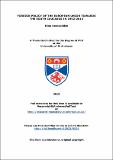Files in this item
Foreign policy of the European Union towards the South Caucasus in 1992-2014
Item metadata
| dc.contributor.advisor | Fawn, Rick | |
| dc.contributor.author | Kereselidze, Nino | |
| dc.coverage.spatial | 247 | en_US |
| dc.date.accessioned | 2015-06-15T08:40:11Z | |
| dc.date.available | 2015-06-15T08:40:11Z | |
| dc.date.issued | 2015-06-23 | |
| dc.identifier.uri | https://hdl.handle.net/10023/6824 | |
| dc.description.abstract | This assessment of European Union foreign policy towards the South Caucasus shows that while the EU has developed a coherent transport policy since 1992, paradoxically, it has had no corresponding coherent conflict resolution policy for this region. The fact that the EU deepened transport cooperation without a mediation policy in an area with a multiplicity of protracted conflicts is a puzzle. Although the EU eventually added mediation to its policy during the Russia-Georgia armed conflict in 2008, it was unable to facilitate a political solution. The research examines what has been the nature of EU foreign policy towards the South Caucasus. The dissertation argues that incoherence in conflict resolution policy has been consequent upon two causal factors: (i) preferences of the EU member states conditioned by their historical experience with Russia, and (ii) institutional framework of the Common Foreign and Security Policy (CFSP). By contrast, with functional approach, the three dominant factors that have enabled coherence in transport cooperation are (i) legislative alignment, (ii) common transport area, including technical assistance for transit development, and (iii) restrictive measures. Examination of these two areas of EU foreign policy, shows a discrepancy, demonstrating its inconsistent nature. The theoretical framework of realism and liberal intergovernmentalism, is applied to empirically grounded EU foreign policy analysis. Adopting a case study methodology, this work examines the EU’s policy towards Armenia and Azerbaijan, with special focus on Georgia between 1992 and 2014. The research combines social science methods of literature review, document analysis and expert interviews. | en_US |
| dc.language.iso | en | en_US |
| dc.publisher | University of St Andrews | |
| dc.subject | European Union (EU) | en_US |
| dc.subject | Common Foreign and Security Policy (CFSP) | en_US |
| dc.subject | European Neighbourhood Policy (ENP) | en_US |
| dc.subject | Eastern Partnership (EaP) | en_US |
| dc.subject | Transport policy | en_US |
| dc.subject | Maritime security | en_US |
| dc.subject | Legislative alignment | en_US |
| dc.subject | Conflict resolution | en_US |
| dc.subject | The South Caucasus | en_US |
| dc.subject | Russia | en_US |
| dc.subject.lcc | JZ1570.A55K4 | |
| dc.subject.lcsh | European Union--Foreign relations--Caucasus, South | en_US |
| dc.subject.lcsh | European Union couuntries--Foreign relations--Caucasus, South | en_US |
| dc.subject.lcsh | Caucasus, South--Foreign relations--European Union countries | en_US |
| dc.title | Foreign policy of the European Union towards the South Caucasus in 1992-2014 | en_US |
| dc.type | Thesis | en_US |
| dc.contributor.sponsor | University of St Andrews | en_US |
| dc.contributor.sponsor | Open Society Foundations (OSF) | en_US |
| dc.contributor.sponsor | Georgia (Republic). Prime Minister's Fund | en_US |
| dc.type.qualificationlevel | Doctoral | en_US |
| dc.type.qualificationname | PhD Doctor of Philosophy | en_US |
| dc.publisher.institution | The University of St Andrews | en_US |
| dc.publisher.department | School of International Relations; Institute of Middle East, Central Asia and Caucasus Studies (MECACS) | en_US |
This item appears in the following Collection(s)
Items in the St Andrews Research Repository are protected by copyright, with all rights reserved, unless otherwise indicated.

